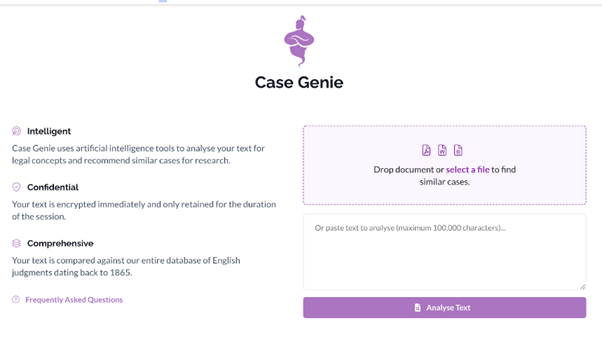Immediate wins
- 35% increase in total searches, views and downloads between January – July 2022 (compared to Jul-Dec 21)
- 54% increase in individual sessions between January – July 2022 (compared to Jul-Dec 21)
- Case Genie selected as a finalist in the 2022 ALPSP Innovation Awards and Most Innovative Use of AI/ML in the 2022 Computing AI and Machine Learning Awards
The brief
ICLR wanted to help lawyers who are building cases to find the most useful information as quickly as possible, without compromising the depth of the search. Until the development of Case Genie, the standard process for researching case law was similar to most information searches – keywords into a search bar with results then filtered for relevancy. It was an incredibly manual process and didn’t offer anything more than the standard user experience found in many other industries. ICLR wanted to improve this and add additional insights into the search results to speed up and improve legal teams’ decision-making. Thus the idea for Case Genie was born, a new premium product built from existing content to support users and diversify revenue opportunities.
Building Case Genie
We created an AI-powered tool which flipped traditional search behaviour on its head. Instead of searching via keywords and manually filtering for relevancy, users now upload their skeleton arguments into Case Genie. The tool uses Natural Language Processing to surface relevant cases, including the ‘unknown unknowns’ which would have been impossible to find using a traditional keyword search.
The aim is to help the lawyer find cases that they might not otherwise have considered. In addition, Case Genie then finds cases cited in the uploaded document and lists them with their subsequent treatment (Approved/Overruled etc). This can save the lawyer significant time. Superadded to those, Case Genie facilitates finding similar paragraphs. When reading the judgement section of a Case Report, the user can click on a paragraph to find paragraphs from other judgments that are conceptually similar. This information can help bring out those ‘unknown unknown’ cases that can transform a user’s research.
Managing sensitive and private data
Maintaining privacy for the users, and their data, is essential in any software that supports the legal system. Case Genie has been designed with this in mind and is incredibly secure, to deal with any issues of privacy. Uploaded document data and information derived from it is never stored unencrypted. Two keys are required to unencrypt the data, one is stored in the system database and is unique for each user; the other is transient and created by the user’s browser for each user session. As soon as the original document has been processed, it is deleted. Derived ephemeral documents are deleted as soon as the initial processing pipeline has completed. The remaining data, required to show the user the results of the processing, is available only for the duration of the user’s session. The machines processing the data are also protected from unauthorized access. It is impossible to connect to them directly, and they are moreover secured by public/private key authentication.
Avoiding bias
Natural language processing is a really interesting tool and one which requires careful planning and consideration to avoid bias and other issues. Machine Learning (ML) falls into two categories: supervised and unsupervised. Supervised learning uses example data that teach the ML algorithm how to predict a given outcome. Supervised learning has all of the pitfalls of bias. Usually, the data have come from real-world decisions made by people, so it embodies the biases of those decisions. Unsupervised learning, however, is not based on previous human decisions. The models created by unsupervised learning map connections between data, but do not try to predict a specific variable. Case Genie uses unsupervised Machine Learning to build document embeddings for each Case Report and judgement transcript. The only biases it embodies are those of the judges in their language (but not their verdict or sentence), which are actually what we are most interested in. Language use also changes over time, so two cases from a specific period are more likely to have high similarity if they cover similar topics. This is also beneficial because it means more recent cases are likely to match new case material; whereas important, older cases will still surface in the results when added as linked results.
Results
The tool is a massive win for users, helping them dig deeper and wider into case law in seconds rather than days, and identify otherwise seemingly unconnected and novel cases that could add value to their legal thinking.
Sir Alastair Norris, former High Court judge of the Chancery Division and a member of the ICLR, concluded: ‘For my generation, the meticulously compiled Law Reports Consolidated Index was an essential tool in practice and a constant aid on the bench. Now a digital version linked with the AI embedded in Case Genie promises to take effective research to another level for this generation. As I have watched the development of ICLR.4 it has been encouraging to see how, through the engagement of the law reporters, the skills of the compiler are still deployed.’
“I cannot tell you just how impressed I was by this. I think it has the potential to be a real game changer for the legal profession.” Faisel Sadiq, Barrister.






